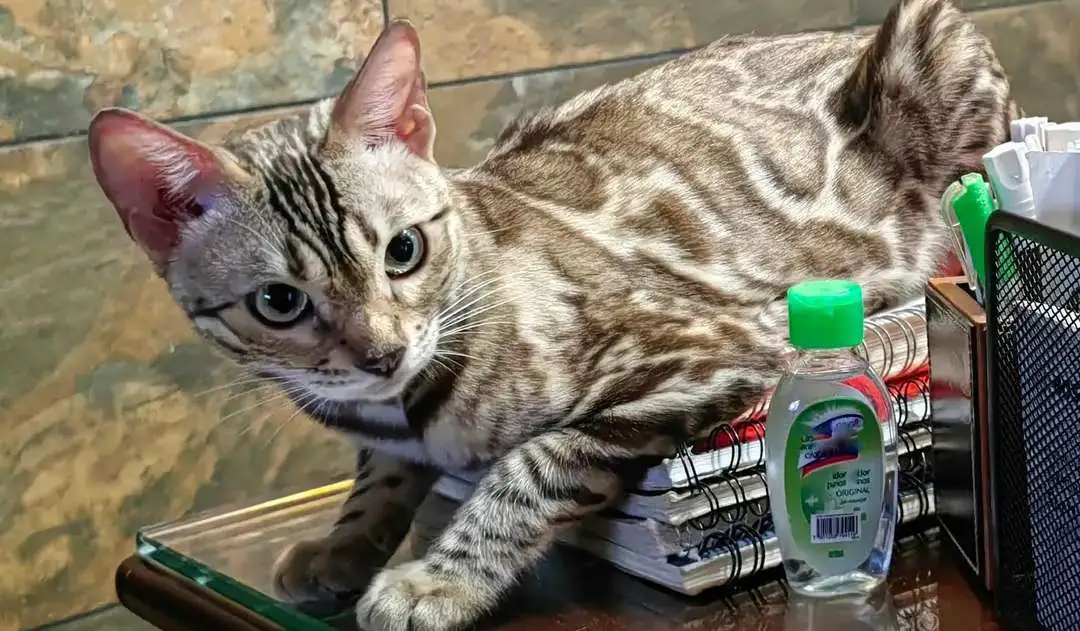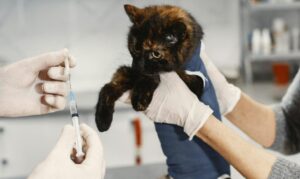As a longtime cat owner, I will discuss some of the most effective ways of keeping your cat healthy in this post, so keep reading to learn more…
Based on my experience living with cats, I can tell you that keeping your cat healthy is a pathway to giving your cat a longer life expectancy.
From a well-balanced diet, engaging playtime, and regular veterinary check-ups, let’s find out more…
Effective Ways of Keeping Your Cat Healthy
Based on what I know about cats, there are a lot of things you can do to keep your cat healthy, therefore, here are some effective ways of keeping your cat healthy:
Get your cat fully vaccinated
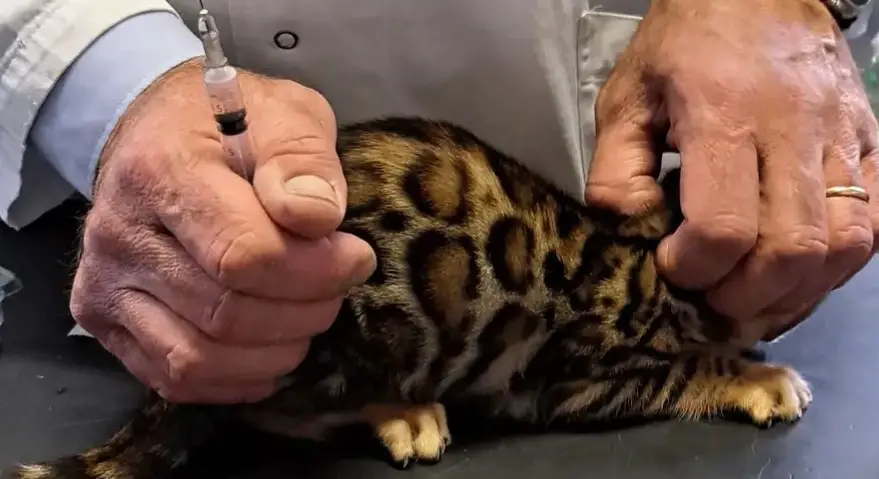
It’s essential to vaccinate your cat early against a range of infectious diseases that may affect their health in the future.
When I vaccinated my cat (Oscar) it cost me a couple of money, but it helped prevent unnecessary and avoidable vet costs.
Starting at about 6 to 8 weeks of age, kittens usually receive a series of immunizations to build up their immunity.
These vaccinations guard against rabies, feline herpesvirus, feline calicivirus, and feline distemper.
Subsequently, your cat will receive booster shots on a regular basis to keep their immunity intact.
To create a vaccination regimen that suits your cat’s requirements and way of life, speak with your veterinarian.
Related: Common Cat Health Concerns.
Feed your cat a high-quality and balanced diet
For the general health and well-being of your cat, proper nutrition is crucial, and this is one of the most important things to do when thinking about keeping your cat healthy.
To be sure the cat food satisfies all of your cat’s nutritional needs, look for the label that says “complete and balanced” or talk with your veterinarian.
Your cat food should ideally include important vitamins and minerals together with high-quality protein sources like fish or poultry.
I advise you to steer clear of foods with a lot of artificial additives or fillers.
To avoid obesity or malnutrition, it’s also critical to always feed your cat fresh water and to keep an eye on their weight.
Brush your cat regularly
Frequent brushing sessions keep your cat’s coat in good condition and help avoid matting.
Brushing keeps their fur clean and lowers the likelihood that they may get hairballs by removing loose hair, dirt, and debris.
The length and kind of your cat’s coat determine how often your cat should be brushed.
Fewer brushing sessions may be necessary for short-haired cats than for long-haired ones, which normally need brushing daily.
To prevent hurting your cat, gently brush or comb their fur with a brush or comb that is appropriate for their type of fur.
In addition to strengthening your bond with your cat, this grooming regimen lets you keep an eye out for any anomalies or parasite symptoms on their skin and coat.
Get your cat neutered or sprayed
There are various health advantages to having your cat spayed (for females) or neutered (for males) which can improve your cat’s overall life expectancy.
From what I gathered, male cat neutering lowers the chance of some prostate issues and helps avoid testicular cancer.
Moreover, it lessens the need to roam and aggressive behavior, as well as urine marking.
Spaying your female cat lowers the risk of mammary gland tumors and completely removes the possibility of uterine infections.
It also avoids unintended pregnancies and the stress of heat cycles that can indirectly affect your cat’s health.
To find out the right age for spaying or neutering your cat, speak with your veterinarian, however, early spaying or neutering is frequently advised.
Proper litter box maintenance
I can tell you from personal experience that keeping your cat’s litter box clean and in good condition is essential to their health and happiness.
Since cats are inherently clean creatures, having an unclean litter box can cause stress and even health issues that will negatively impact your cat’s general well-being.
To avoid the accumulation of bacteria and smells, make sure you clean the litter box on a regular basis and thoroughly replace the litter in addition to scooping out any waste and clumps every day.
You may provide your cat with a comfortable and hygienic environment and lower the risk of urinary tract infections and other litter box-related problems by keeping the litter box clean.
Maintaining a healthy weight
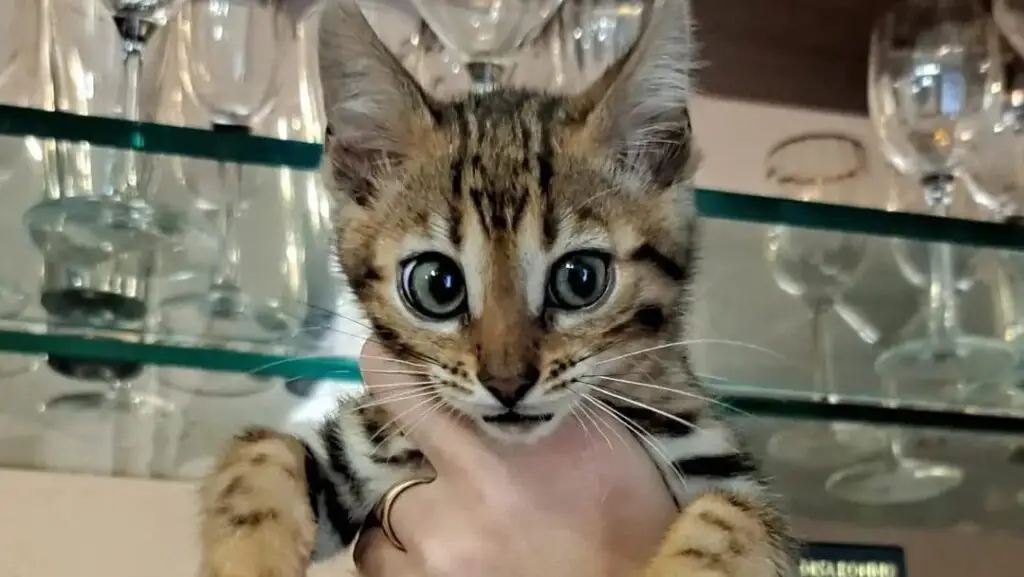
Cats who are obese often struggle with health issues and may develop diabetes, arthritis, heart disease, and other conditions.
Therefore, I recommend you feed your cat a balanced diet and promote regular activity in order to maintain a healthy weight.
To find out the right kinds and portion sizes of food for your cat’s requirements, speak with your veterinarian.
Select premium cat food that satisfies all of their nutritional needs and refrain from overfeeding them.
To keep your cat active and assist in burning off extra energy, involve them in playtime activities. This could involve engaging toys, climbing frames, or even simply a basic game of feather toy chase.
Regular exercise is not only beneficial for their physical health but also helps to keep their minds stimulated and prevent boredom.
Providing fresh water regularly
Always keep in mind that cats require access to clean water at all times, as dehydration can result in a number of health concerns, including urinary tract infections.
Make sure your cat has access to a clean water source, like a pet fountain or water bowl.
Due to their reputation as picky eaters, cats require clean, fresh water at all times.
To stop the growth of germs or algae, clean the bowl and change the water frequently.
Investing in a cat fountain could be a good idea if your cat likes running water because it might encourage them to drink more.
Preventing parasites around your cat
In addition to being uncomfortable, parasites like fleas and ticks can harm your cat’s health in a number of ways.
I strongly recommend you check your cat frequently for ticks and fleas, especially if they spend time outside or are around other animals.
For advice on the most effective parasite prevention methods for your cat, including topical treatments or oral drugs, I suggest you speak with your veterinarian.
Additionally, vacuum and wash your cat’s bedding on a regular basis to maintain a clean living space for them.
By doing this, you’ll reduce the possibility that fleas and other parasites may invade your house.
Provide and maintain oral hygiene
I can tell you that cats definitely endure a number of dental issues, like gum disease and tooth decay, based on my experience with my cat, Oscar.
Providing your cat with appropriate dental hygiene is crucial to maintaining the health of their teeth and gums.
Therefore, I recommend you use toothpaste and a toothbrush that is suitable for cats, you can accomplish this by routinely brushing your cat’s teeth.
Plaque and tartar buildup can also be removed by giving them dental snacks and toys made to support good oral hygiene.
To detect tooth problems early on, routine veterinary dental examinations are also essential.
Promoting regular exercise
In order to keep a healthy weight and keep cats from becoming obese, exercise is crucial.
Having regular play sessions with your cat will help them maintain muscle tone and burn off extra energy.
Give your cat interactive toys that he must pursue, pounce, and leap on to promote physical exercise.
Another option is to set up a scratching post or cat tree so your cat can climb and stretch.
It is important to customize the training regimen to your cat’s age, health, and preferences.
Creating a stress-free environment
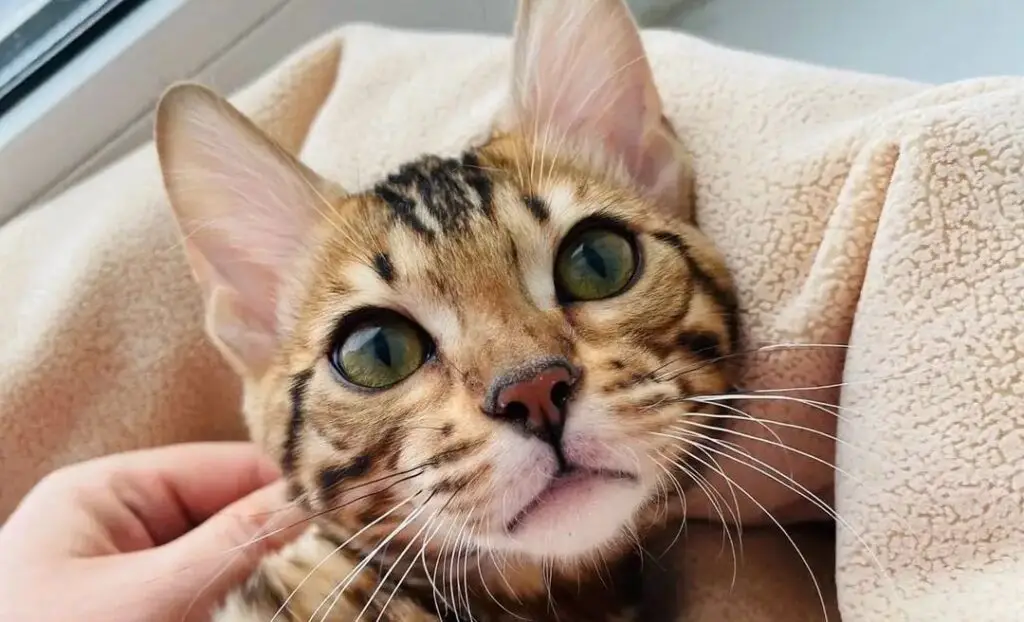
Stress can negatively affect a cat’s general health because they are sensitive animals.
To avoid this, I suggest you make sure your cat has a calm, secure place they can go to when they’re feeling overwhelmed in order to foster a stress-free atmosphere.
Also, make sure there are lots of places to hide, cozy bedding, and vertical climbing areas.
Creating a regular schedule for grooming, playtime, and feeding will also help your cat feel safe and predictable.
I advise you to reduce your exposure to loud noises, abrupt changes, and other stressors like hostile animals or strange guests, as this can also affect your cat’s health.
Gently wipe around your cat’s eyes daily
If left untreated, discharge or tear stains around the eyes can cause pain or even illness in cats.
So, I recommend you use a moist cloth or pet-safe eye wipe to gently clean the area around your cat’s eyes to ensure good eye health.
Make sure you touch them gently and don’t put any cloth or solution in their eyes directly.
Your cat’s eyes can remain healthy and avoid accumulation with regular cleaning.
Trim your cat’s nails regularly
Cats can have very long, sharp nails, which increases the risk of furniture damage or accidents involving scratches.
You should periodically clip your cat’s nails to keep them neat and tidy.
Carefully trim the tips of your cat’s nails with nail clippers or grinders made specifically for cats.
Cutting too near to the quick might result in blood and pain, so proceed with caution.
Seek advice from a professional groomer or your veterinarian if you’re not sure how to clip your cat’s nails.
Bathe your cat occasionally
Despite their propensity for self-grooming, cats can benefit from an occasional bath to keep their coat clean and clear of debris, grime, and parasites.
To bathe your cat, use warm water and a shampoo designed specifically for cats. Making bathing a joyful experience by rewarding good behavior with praise and treats is important.
But keep in mind that not all cats love taking baths, so if your cat starts to act tense or nervous, you can stick to other ways to groom them or train them to love baths.
Related: Signs of a sick cat.
Regular veterinary check-ups
For the general health and well-being of your cat, routine veterinary checkups are necessary.
To identify and treat any potential health issues early on, a veterinarian can run essential testing, give immunizations, and conduct thorough examinations.
They can also offer advice on controlling behavior, preventing parasites, and diet.
Continue to adhere to the vaccination schedule prescribed by your veterinarian and plan yearly examinations for regular preventative care.
Related: When should you take your cat to the veterinarian?
Conclusion
Maintaining your cat’s health is crucial for their overall vitality and happiness. You can ensure a thriving and content feline companion by focusing on a well-balanced diet, engaging playtime, and regular veterinary check-ups. Remember, a healthy cat equals a life filled with purrfection!

